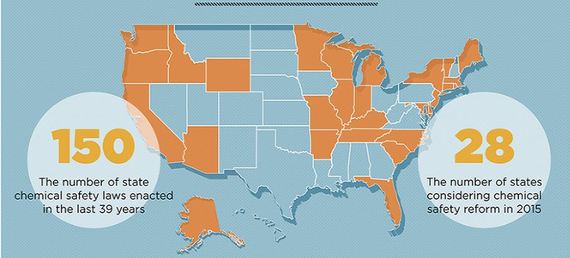A recent New York Times Magazine investigation revealed the history of deception by the chemical giant DuPont around its toxic Teflon chemical PFOA (perfluorooctanoic acid, also called C8). The story focuses on Rob Bilott, the heroic lawyer who had previously worked for chemical companies only to become the whistleblower who took on DuPont for its lengthy history of pollution.
The story begins at a West Virginia farm where DuPont had been dumping PFOA for years. In the fall of 2000, after DuPont refused to hand over its records, Bilott asked the court to order the company to do so. When he ultimately received the documents, Bilott found a smoking gun: DuPont's internal documents showed that the company had been covering up its knowledge of the health risks from PFOAs for nearly 40 years.
Over decades, DuPont continued to market dangerous products made with PFOA -- and continued to dump PFOA-laden waste, not only on the farm but also in areas that ultimately poisoned the drinking water for 70,000 people. Products with PFOAs were worth $1 billion in annual profits to DuPont, until the company finally agreed to stop producing the chemical in 2013. Today, DuPont has spun off its chemical business, which now operates as a "new" independent company called Chemours.
As a New York Times editorial noted, Congress is currently considering proposals to change the federal government's failure to regulate harmful chemicals. The Times called on Congress to adopt "the strongest possible reform." But reining in the egregious behavior of chemical companies that have more than a century of experience in gaming the system to their advantage will not be easy. Congress has an opportunity to rein in corporate abuses with its new draft chemical safety bills (having moved through both chambers), but this can only happen if states retain the power to protect citizens.
States have historically been ahead of the federal government when it comes to protecting Americans from harmful chemicals. For example, in 1986, California voters overwhelmingly approved the Safe Drinking Water and Toxic Enforcement Act, commonly known as Prop 65. This law has created landmark public health gains that have created national changes for chemical safety.
Under Prop 65, our organization has reached legal agreements with hundreds of major companies, including Disney, Target, Chrysler and others that have taken national action to end sales of toxic products. Prop 65 has ended the use arsenic-treated wood in playground equipment, eliminated the use of cancer-causing flame retardant chemicals in furniture and stopped companies from selling baby bibs, lunchboxes, toys and dozens of other children's products made with lead-tainted materials.
Reading the Times story on DuPont may be shocking to those who are not familiar with the chemical industry's history. But sadly, the DuPont case around PFOA is simply the latest repetition of the industry's tried-and-true tactics.
Take the case of the chemical company Ciba, a history documented in the recent Pulitzer Prize winning book Toms River (you can hear our talk with author Dan Fagin on the CEH podcast). After its dye factory polluted the drinking water in the New Jersey town of Toms River for decades, the company's cover-up came to light when lawsuits uncovered internal documents showing that Ciba (later Ciba-Geigy) had long known about the potential health risks from its polluting operations, but chose to put its profits above public health. Ciba ultimately merged with Sandoz to form a "new" company, Novartis, which ultimately spun off its chemicals division into the "new" company Syngenta.
Or take a look at the chemical company Monsanto and its factory in the town of Anniston, Alabama. Monsanto produced PCBs (polychlorinated biphenyls) there for decades, routinely discharging PCB-laden toxic waste into a local creek and dumping millions of pounds of PCBs into open-pit landfills. As a Washington Post investigation notes, "...[T]housands of pages of Monsanto documents -- many emblazoned with warnings such as "CONFIDENTIAL: Read and Destroy" -- show that for decades, the corporate giant concealed what it did and what it knew" about the health risks from PCBs.
Monsanto was even more blunt than other companies about putting profits ahead of human health: the company feared that revealing what it knew about the health threats from PCBs would be costly, with one internal company document noting that "We can't afford to lose one dollar of business."
Can you guess what happened with Monsanto's chemical business? That's right, a spin off was created, founding the "new" chemical company Solutia.
Chemicals like PFOA, dye chemicals and PCBs are, as the Times story noted, just a few of the "more than 60,000 synthetic chemicals that companies produced and released into the world without regulatory oversight." You probably wouldn't buy a car if you found out the automaker never conducted government-required crash tests, but every day we all use products made with chemicals that have never been evaluated for their potential to harm our or our children's health.
In creating a new federal rule, Congress must not pre-empt successful state laws like Prop 65 that all Americans count on for our children's and families' protection. Readers can urge your Senators and Congress members to insure that states' rights to develop their own chemical regulations are protected in any new chemical safety bill.
